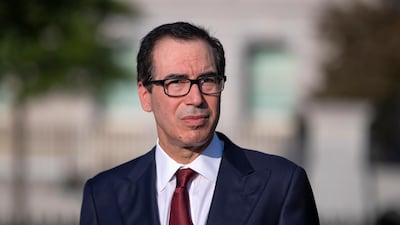US trade negotiators want to make "meaningful progress" in coming talks with China, Treasury Secretary Steven Mnuchin said on Thursday.
On Wednesday, conciliatory gestures by both sides boosted hopes of an eventual resolution.
Mr Mnuchin was "cautiously optimistic" about chances for a deal to resolve the conflict, he told CNBC.
But Washington and Beijing will first hold talks at the deputy level to ensure senior officials who meet later can make advance towards an agreement.
"We don't want a trip that's just a series of discussions," Mr Mnuchin said. "We want to make meaningful progress."
He repeated his warning that US President Donald Trump would only accept a good deal and was willing to raise tariffs further to get it.
There have been positive signs this week in the trade conflict, now entering its second year.
Mr Trump agreed to Beijing's request to delay a round of tariff increases on $250 billion (Dh918.29bn) worth of goods until October 15, after China agreed to spare some US products from its retaliation.
China said on Thursday that it was "making inquiries" about buying American farm products including big-ticket items such as pork and soybeans, which were not on its earlier list of spared goods.
"It is expected that China will be buying large amounts of our agricultural products," Mr Trump tweeted early on Thursday.
American farmers have borne the brunt of the US-China trade dispute, especially after US soy exports collapsed last year, virtually wiping out foreign markets that farmers had spent years cultivating.
Mr Trump has accused Beijing of reneging on promises to buy more US farm goods and has offered billions in aid to farms badly damaged in the trade war.
Senior US and Chinese officials are due to hold preliminary talks this month, in preparation for meetings in early October led by Mr Mnuchin and US trade representative Bob Lighthizer.
"We clearly didn't make the progress we wanted to" at the last meeting in Shanghai in late July, Mr Mnuchin said.
"I'm cautiously optimistic. I take the Chinese in good faith that they want to come here with a deal now."
But he said Mr Trump was "prepared to keep these tariffs in place. He's prepared to raise tariffs if we need to raise tariffs".
The president's hardline trade adviser, Peter Navarro, told CNN Thursday that the US was focused on "seven acts of economic aggression" by China.
Mr Navarro said they included hacking US computers to steal business secrets, intellectual property theft and currency manipulation.
Mr Mnuchin said Hong Kong's pro-democracy movement was "definitely not on the table".
"That is an issue for the Secretary of State [Mike Pompeo] to deal with," he said.
Millions of people have demonstrated over the past 14 weeks in the biggest challenge to China's rule of the financial centre since its handover from Britain in 1997.
Hong Kong's pro-Beijing Chief Executive, Carrie Lam, warned the US on Tuesday not to interfere with her government's response to the protests.
Reducing America's huge trade deficit with China has long been one of Mr Trump's principal aims, but so far it has proven unsuccessful.
In 2018, the US goods trade deficit with China was $419.52bn.
Mr Trump has long regarded deficits to be a defeat for the US, saying they amount to stealing. It is a position rejected by most economists.
Meanwhile, he insists that the protracted trade war is damaging China more than the US and that China is "eating the tariffs".
The US Treasury has taken in $66bn in Customs duties in the 11 months to the end of August, 73 per cent more than in the same period last year. The tariffs are paid by American importers.
Experts have warned there are signs the US is also feeling the pinch, with job creation slowing across major industries last month, and manufacturing losing pace.

